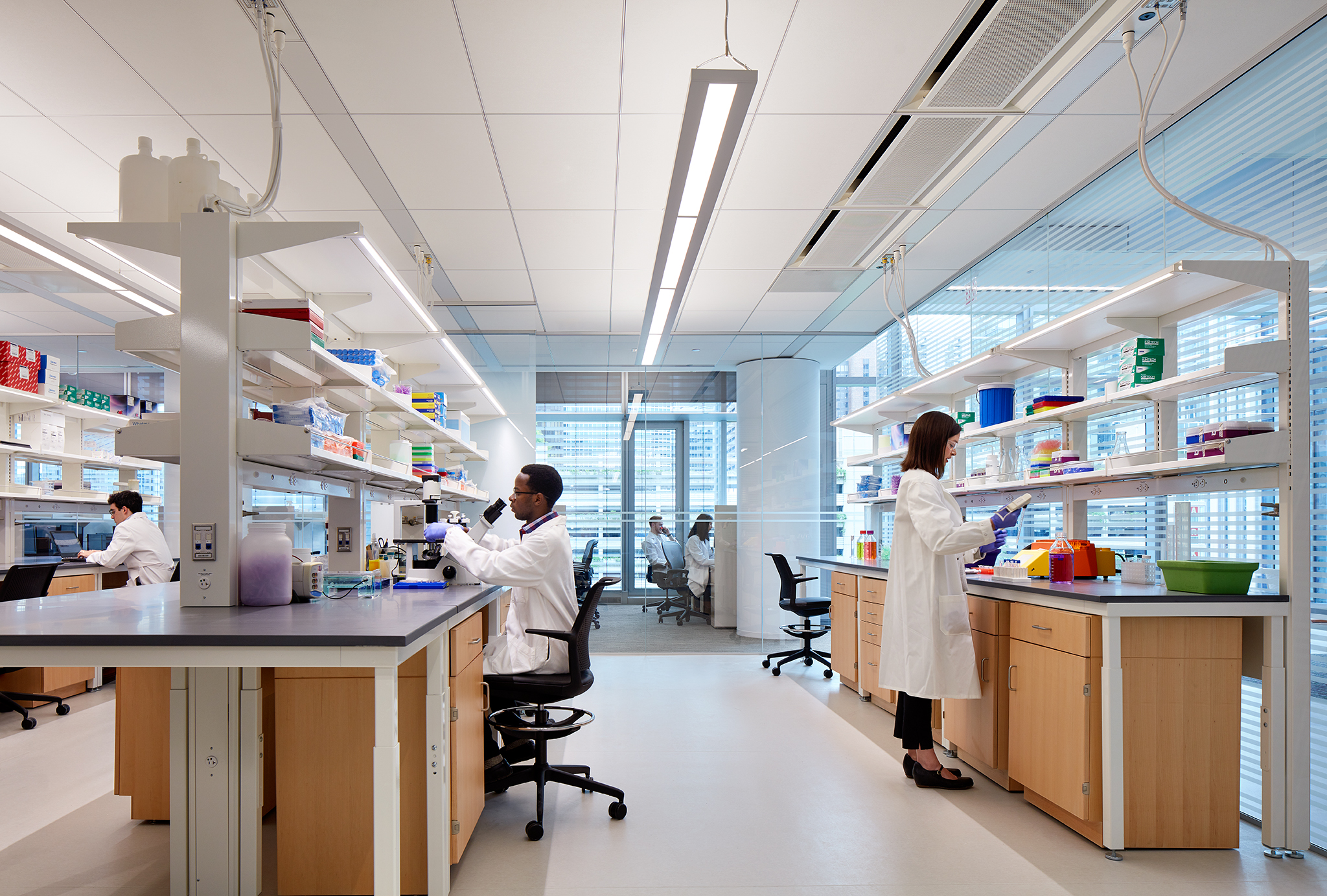Green Labs Program

As a premier research institution, Northwestern operates over 600 labs. These are some of the most resource-intensive facilities on the University campuses. In fact, the average lab uses 5 to 10 times more energy and water per square foot than a typical office.[1] Lab practices also generate large amounts of chemical, physical, and hazardous waste. Lab personnel have essential roles to play in reducing the University’s environmental footprint.
Northwestern’s Green Labs Program catalyzes lab users to adopt best practices for sustainable lab management and operations, without sacrificing research quality or lab safety. Green Labs ensures that our researchers have the support, resources, and knowledge necessary to conduct sustainable world-class research.
We understand that labs differ in their function, operations, and goals. The Green Labs Program is adaptable and the sustainNU team is here to work with labs to ensure the process is effective and relevant for a variety of lab environments on campus. Have a question? Reach out to us at sustainNU@northwestern.edu.
Benefits of certification

Participating labs receive assistance implementing sustainability initiatives to conserve resources, reduce costs, and improve lab member wellbeing. As an additional incentive, Northwestern's preferred lab supply vendor, Thermo Fisher Scientific, offers all newly certified labs a one-time 40% discount code on an item from their sustainable catalog.
Certified labs receive University-wide recognition and certification materials, including a framed certificate, certification stickers and window clings, and a logo that can be used on websites and email signatures. Certified labs become part of a community of green leaders across Northwestern’s campuses.
Certification goals and impact
The Green Labs Certification Program:
- Encourages efficient use of lab resources, expanding on best practices in lab management;
- Educates, equips, and catalyzes scientists to incorporate sustainability into operations and become part of a campus-wide culture shift;
- Provides a connection between Northwestern’s sustainability commitments and the daily practices of the University community;
- Recognizes and celebrates Green Lab leaders who complete the Northwestern Green Labs Certification Program.
The certification process
- Contact sustainNU
sustainNU will hold an introductory meeting to review certification benefits and process. - Get approval
Laboratory leadership should be informed and provide approval before proceeding with certification. - Schedule a walkthrough of the lab space
A walkthrough with the lab and sustainNU helps to identify opportunities through the Green Labs Assessment Form. - Assign a Green Labs leader and/or team
The lab must have an active green labs leader and, if possible, a team of 2+ members who communicate and lead green initiatives. - Host a staff presentation
The lab must participate in the Green Labs presentation given by sustainNU. The Lab Member Participation Form will be submitted to document this. - Check in with sustainNU
Update sustainNU on the status of your certification process, share a target completion date, and receive support. - Complete the Green Labs Commitment Guide
Complete at least 75% of applicable sustainability practices in the Green Labs Certification Guide. Signage, stickers, and other communications resources are available from sustainNU. - Receive certification.
Plan a Green Labs celebration and presentation of your certification materials.
Ongoing: Maintain Engagement in Lab Sustainability
Maintain an active green team and continue the sustainability practices implemented through this program.
After certification
Green Labs are expected to stay engaged in sustainability even after achieving certification. This is not a “one-and-done” process, but an ongoing shift in lab culture. While there is not currently a requirement for recertification, we ask lab managers to ensure sustainable practices are passed on as staff and student turnover occurs. Sustainability commitments should be made clear during lab orientation and reminders should be posted throughout the lab. sustainNU is here as a resource for revamping sustainability practices over time.
Get started today
Getting started is simple. Reach out to sustainNU at sustainNU@northwestern.edu to set up an introduction and schedule your lab walkthrough.
Connect with sustainNU
Sign up for sustainNU newsletters and follow @sustainNU on Instagram and Twitter to stay up to date on Northwestern sustainability initiatives.
Download Green Labs Materials
This overview of the Green Labs program includes the certification process and program requirements.
Use this form to list all members of the lab and track participation in the Green Labs Presentation.
This form is used to guide a lab walkthrough with a representative from sustainNU to assess equipment, resource use, and areas for improvement.
Green Labs Certification Guide
Use this guide to implement best practices for lab sustainability. To become certified, your lab must commit to at least 75% of applicable sustainability practices.
Chemical Redistribution Requirements
This document contains essential information on the safe repurposing of chemicals as part of the Green Labs Program.
Use this guide to aid in setting up your Green Labs Profile on the sustainNU website. We are excited to share your successes!
Thermo Fisher Scientific Reward Letter
Thermo Fisher Scientific has partnered with sustainNU to offer an exclusive, one-time 40% discount code to all newly certified labs. A representative from Thermo Fisher Scientific will reach out to your Green Labs lead with information after your certification is complete.
Thank you to Thermo Fisher Scientific for their partnership in furthering sustainability at Northwestern and to the University stakeholders who played a large role in creating this program, including: Research Safety, the Institute for Sustainability and Energy at Northwestern, the Science Policy Outreach Taskforce, the Department of Chemistry, Facilities, and the Feinberg School of Medicine.
[1] US Environmental Protection Agency and US Department of Energy. “Laboratories for the 21st Century: An Introduction to Low-Energy Design” (2008). Retrieved from nrel.gov/docs/fy08osti/29413.pdf